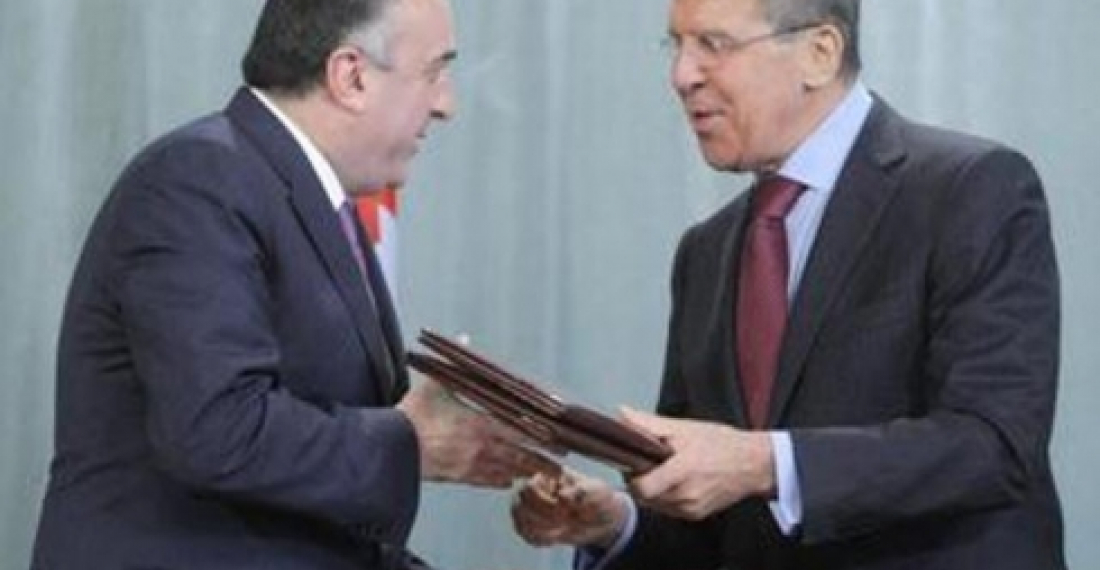The Russian Foreign Minister Sergei Lavrov has been on a charm offensive in the South Caucasus, visiting Armenia and Azerbaijan to mark the 20th anniversary of the establishment of diplomatic relations between Russia and the two countries.
The region, once part of the Tsarist empire, and later of the Soviet Union, has since 1991 splintered into three countries, with a further three entities seceding from these soon after.
A lot of Russia's efforts in the region in the last decade has been spent on ensuring that Azerbaijan does not follow in the way of Georgia and become a hostile neighbour to Russia. This has not been easy given Russia's special relations with Armenia. This Russian concern could be felt from Lavrov's speeches in Baku yesterday. Lavrov praised the way the two countries had been able to work together. "Over recent years we have shown that we are able to develop mutually beneficial dialogue and to resolve the most complex problems, including delimitation of the state border. Russia is ready to continue developing partnership with Azerbaijan."
The major sticking point remains Karabakh, where the Azerbaijanis have decided that Russians are the key to pushing the Armenians into handing its territories back. The Azerbaijani Foreign Minister Elmar Mammadyarov expressed gratitude to Russian President Dmitriy Medvedev for his initiatives to settle the Armenian-Azerbaijani conflict over Nagorno-Karabakh. "Unfortunately we have not achieved it yet, but I hope we will achieve the settlement of the problem and move the situation from the point of status quo," the minister told a news briefing after meeting his Russian counterpart.
Sergey Lavrov said that Russia was interested in a settlement of the problem as soon as possible: "The decision must be acceptable to all sides. Russia is continuing its mediation mission to settle the conflict."
The two ministers said that they had discussed the extension of Russia's lease of the Gabala radar station in Azerbaijan, but gave nothing away about the details of the talks. Sergey Lavrov said that the negotiations were being handled by the two countries' defence ministries. Mammadyarov recalled that Azerbaijan had set up a special commission to deal with the issue: "Now the commission is considering Russia's proposals on extending the lease of Gabala radar station." Russia is desperate to keep the Gabala facility and the Azerbaijanis are not in principle against, but they are making the Russian's sweat a little bit before they say yes.
A more serious issue is the Caspian Sea. The Russians are furious at the European Union's plan to sign a Treaty with Turkmenistan and Azerbaijan on the transit of Turkmen Gas through the Caspian.
The Iranian news agency IRNA reported that whilst addressing Yerevan State University students, during his visit to Armenia, Lavrov said the European Union’s decision to exploit the Caspian Sea and transfer Turkmenistan gas to Europe without taking into account the stance of Caspian littoral states is unacceptable. Lavrov said that the Caspian Sea legal regime had been agreed in 1921 and 1940 by the then Soviet Union and Iran, and after the collapse of the USSR negotiations on a new regime had started.
On the legal status of the Caspian Sea, Sergey Lavrov said: "The use of the Caspian Sea water area must be solved with the participation of all five Caspian littoral countries." "Foreign actors, especially the European Union, will respect the decision of the five Caspian countries."
In Baku Lavrov said that speeding up work on a Convention on the Legal Status of the Caspian Sea was especially important. Exactly what he said in private on this subject to his Azerbaijani counterpart is not clear.
Lavrov is not visiting Georgia on this trip. The two countries currently do not have diplomatic relations after Georgia cut off relations following the Russian recognition of the secessionist territories of Abkhazia and South Ossetia.
source: commonspace.eu with APA, News.az and IRNA
photo: Sergei Lavrov and Eldar Mammadyarov exchange bound collections of documents signed by Azerbaijan and Russia between 1992 and 2012 after their meeting in Baku yesterday (picture courtesy of APA)







